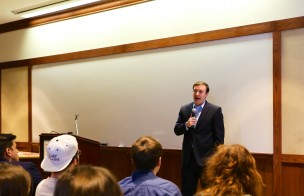
Late in the morning on Saturday, Feb. 8, over one hundred students, professors, and Middletown residents convened in Exley’s Woodhead Lounge to hear Connecticut Senator Chris Murphy speak about the Patient Protection and Affordable Care Act (ACA). Among the guests were Matt Lesser ’10, a former Wesleyan student and sitting State Senator who introduced Senator Murphy; State Representative Hilda Santiago; and Middletown Mayor Dan Drew. The event was hosted by the University group Wesleyan Young Advocates (WYA), which works to enroll students and members of the larger Middletown community in the ACA in coordination with the Community Health Center on Main St.
Marshal Lawler ’16, one of two key organizers and a member of WYA, noted that the turnout, while large, was not unexpected.
“People are really receptive to anything to do with the ACA, just because it has been in the news so much lately and Wesleyan is a pretty liberal campus,” Lawler said.
The success of the ACA has led proponents, like Wesleyan Democrats President Ben Florsheim ’14, to herald the Act as a touchstone of progressive reform. In an interview prior to the event, Florsheim commended Connecticut on its unique successes and attributed shortcomings in other states to Republican stewardship.
“In Connecticut and other states with Democratic governors, people who need health insurance are getting it with no problems,” Florsheim said. “In states with GOP governors, they’re not.”
Florsheim speculated about the
future of the ACA and the influence Republican leaders may have on it.
“I hope that other states will learn from the example being set here, but in a lot of cases, if I’m being honest, I think the replacement of some Republican governors is going to be a prerequisite for progress,” Florsheim said.
Florsheim’s remarks echoed the narrative that Democratic legislators like Senator Murphy have maintained throughout the rollout of the ACA. At the event, Murphy highlighted successes, but was quick to ensure that they did not eclipse the gravity of coming challenges.
“We are a success story here in Connecticut,” Murphy said. “What Connecticut has shown when it comes to the Affordable Care Act is that when you make the decision to implement the law, rather than oppose the law, it works.”
Murphy stressed the importance of gaining the support of young Connecticut residents.
“The law only works if people sign up,” Murphy said. “The whole success of this entire enrollment period—which only lasts for the next 60 days—rests on our ability to sign up young people.”
However, various University students at the event attested to the fact that, while they may support the ACA, they do not feel the need to sign up. Jacob Seltzer ’17, who attended the event, commented on his perception of the ACA. Although quick to state his support for the act, Seltzer added that he has yet to feel its impacts.
“I have insurance from my parents, so I don’t really have to deal with that kind of stuff,” Seltzer said.
Likewise, Quinnipiac Democrats President Jacob Nadeau from Quinnipiac University conceded that college students were unlikely to see direct benefits until graduation.
“Students will really only see benefits after college when they have entry level jobs without coverage,” Nadeau said.
Others, such as Danny Blinderman ’14 and Michael Linden ’15, contended that the ACA actually does affect them directly, and that, in a broader context, it fulfills something of a moral imperative.
“I’m very privileged to have insurance, but I have friends here who don’t, and to the extent that it helps them, I think it does affect me,” Blinderman said.
Linden voiced his agreement with Blinderman’s statement.
“I can stay on my parents’ healthcare until [I’m] 26, but as a college student who cares about larger issues, I think the ACA is very important to me,” Linden said.
According to Sagar Parekh, the founder and driving force behind the on-campus group, Blinderman and Linden have the right mentalities, and Parekh hopes that this kind of thinking will inspire a new crop of activists.
“We need to take care of each other,” Parekh said. “We need to take care of those who otherwise can’t afford it.”
Murphy linked pragmatic benefits from the ACA to these ethical concerns, citing annual savings of $250 billion and the elimination of what he termed “job-lock,” the idea that individuals have to work many hours to get insurance and cannot afford to either scale back those hours or seek other employment for fear of losing that insurance.
“There is economic freedom that comes with this bill,” Murphy said.
After answering questions on an array of issues including Syrian intervention, the Kirk-Menendez Bill, environmental policy, and the ACA, Murphy closed by imploring University students to get involved.
“There are some really brilliant people here, and I need your help,” Murphy said. “Your input, be it sending an article that you think me or one of my staffers should check out, or whether it’s sending me a tweet or posting something on our Facebook wall giving me a little feedback about something I did or a vote I cast, all of that gets assimilated into our operation and not all of it, but a lot of it, gets to me as well.”


Leave a Reply